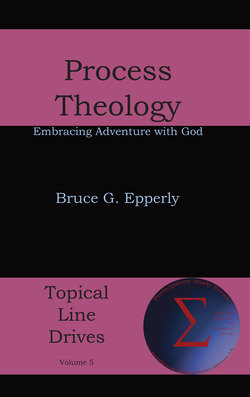Process Theology

Реклама. ООО «ЛитРес», ИНН: 7719571260.
Оглавление
Bruce G Epperly. Process Theology
Отрывок из книги
Process Theology
Embracing Adventure with God
.....
In the months following her theological epiphany, Susan began reading process theology. She had many questions and struggled with the contrasts between process theology and the faith of her childhood church. But, one afternoon she asserted, “I am so grateful for your introducing me a new way of looking at God and the world. I feel like I’m coming home to a God I can believe in. I don’t have to be afraid of my doubts. I see faith as an ongoing adventure with God right beside me, challenging me with new ways of looking at things. God is real to me again. God is right here in your study and down on the beach. I can find God wherever I go, listening and sharing, and growing along with me.” Susan had rediscovered a living God through encountering the welcoming spirit of process theology.
The Origins of Process Theology. Theology has always been connected with philosophical reflection. One of the greatest theologians, Augustine of Hippo (354-430 CE), was shaped by Greek philosophical ideas of perfection, meditated through the thought of the philosopher Plotinus and Neoplatonism. He struggled to connect the lively embodiment of Hebraic spirituality and Jesus’ ministry with the neo-Platonic definition of perfection as unchanging and embodiment as a hindrance to spiritual growth. Another great Christian theologian Thomas Aquinas (1225-1274) was influenced by Aristotle, who described the ultimate reality as the Unmoved Mover. Any change in God or influence from the changing world on God’s experience constituted a diminishment of divine perfection. Aquinas also struggled to join the unchanging divinity of Greek thought with the lively, intimate and emotional God of the Bible, embodied most fully in the Suffering Savior, Jesus of Nazareth. The parents of the Protestant Reformation Martin Luther (1483-1546) and John Calvin (1509-1564) saw God as dynamic and active in the world, but also struggled with the character of divine knowledge and power. Their understandings of divine perfection required God to have active foreknowledge and foreordination in relationship to the events of the world. Nothing new could possibly happen to God nor could the world determine any aspect of God’s experience. Their vision of divine activity demanded either: 1) that God predestine in advance all the events of history, including the fate of humans as saved and damned or 2) that God choose those who were saved in an eternal vision, while overlooking the unsaved entirely. As a result of their understandings of divine knowledge, power, and grace, they saw humans as powerless to effect anything positive apart from divine initiative and determination.
.....